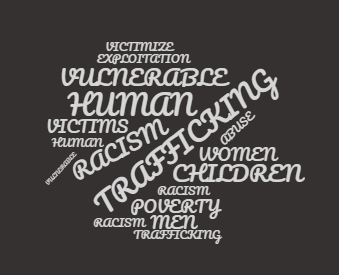February, 2019 Monthly Reflection
February 1, 2019
A Reflection On The Intersection Of Racism And Human Trafficking
By Sister Maryann Mueller, NA
As we celebrate Black History Month, it seems appropriate to reflect on the intersection of racism with human trafficking. Almost anywhere in the world, victims of trafficking are disproportionately racial and ethnic minorities.1 African-Americans make up about 12.7 of the total population in the United States,2 however it is estimated that 40 percent of victims of human trafficking are African-Americans, 3 while 77 percent of child sex trafficking victims are non-white.4 Many of these victims live in poverty and have a history of exploitation, substance or sexual abuse, learning disabilities and inadequate support systems.5
Advocates and researchers have suggested several reasons why African Americans are overrepresented as victims of human trafficking. Many live in poverty which increases their vulnerability. Shared Hope International reports that a majority of identified victims in Texas cities are racial minorities and come from households with vulnerable socioeconomic status.6 Traffickers report that they operate more easily in low-income African American communities.7 Ina recent study that looked at the economics of human trafficking, a majority of the traffickers interviewed believed that trafficking black women would result in less prison time if caught.8
Non-white trafficking victims are often further victimized by a system that is less likely to see them as victims, and instead is more likely to view them as criminals. Early anti-trafficking legislation, such as the Mann Act and the “white slavery” campaign, not only excluded people of color from legal protection but often was used to persecute, rather than protect them.9 In a recent Trafficking in Persons Report, the State Department determined that the failure to properly identify victims of modern day slavery is a major barrier to addressing the crime itself in the United States and worldwide.10
In the United States, misidentification of victims normally occurs when law enforcement officers stereotype trafficking victims as criminals rather than victims. Our news has been replete with stories of how biases against people of color have undermined the ability of police to respond properly. When law enforcement fail to identify victims, or misjudge them as criminals, the victims lose access to justice. Many of these victims are then subjected to arrest or prosecution. These failures reinforce what traffickers notably threaten their victims, that law enforcement will incarcerate them if they seek help.11
Racial biases also influence whether males are identified as victims. Men and boys of color are rarely perceived as victims of human trafficking. 12
What can we do to help advocate for all our brothers and sisters? Advocacy always begins by recognizing the signs of human trafficking. There is no doubt that race is a factor in trafficking. Call upon legislators and advocates to address some of the unique vulnerabilities that people of color face with respect to both sex and labor trafficking.
Policies adopted during the Obama administration stressed the need for an increased role of minority youth as leaders in the anti-trafficking movement.9 Recent legislation passed by the House and signed by the president, the Frederick Douglass Trafficking Victims Prevention and Protection Reauthorization Act of 2018 (H.R. 2200), authorizes programs to educate children on the dangers of trafficking while offering victim services grants which may be used for programs that provide trauma-informed care or long-term housing for women or girls in underserved populations.
More attention must be given to the racial disparity of trafficking victims, both in the United States and globally, and ensure that it not remain unknown—or ignored.
- https://thefreedomstory.org/confronting-the-beast-racisms-role-in-human-trafficking
- https://en.wikipedia.org/wiki/Race_and_ethnicity_in_the_United_States
- http://victimsofcrime.org/docs/ncvrw2013/2013ncvrw_stats_humantrafficking.pdf?sfvrsn=0
- https://thefreedomstory.org/confronting-the-beast-racisms-role-in-human-trafficking
- https://thevoiceofblackcincinnati.com/african-american-human-trafficking/
- https://www.uclalawreview.org/wp-content/uploads/2015/08/Butler-final_8.15.pdf
- https://thevoiceofblackcincinnati.com/african-american-human-trafficking/
- http://humantraffickingsearch.org/human-trafficking-not-all-black-or-white/
- https://www.uclalawreview.org/wp-content/uploads/2015/08/Butler-final_8.15.pdf
- https://www.state.gov/documents/organization/282798.pdf212
- https://www.state.gov/j/tip/rls/tiprpt/2013/
- http://www.ndaa.org/pdf/
Category: Monthly Reflections

